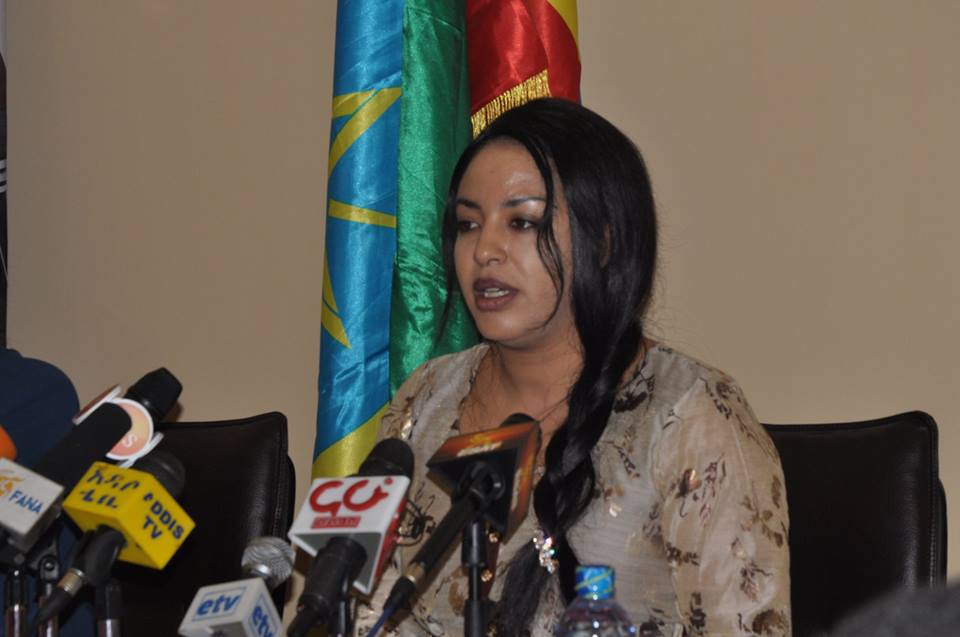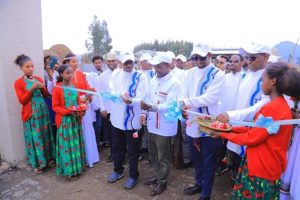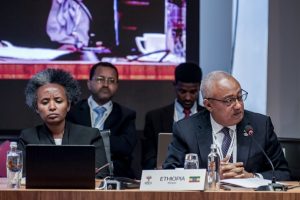
ADDIS ABABA- The agreement on legal overseas employment process to Saudi Arabia reached at final step to launch. Technical committee from both countries has been established, the Ministry of Labour and Social Affairs (MoLSA) said. Briefing journalists here yesterday, Minister Dr. Ergoge Tesfaye said that Ethiopia made agreement with Middle East countries about overseas employment. Saudi Arabia and Qatar approved the agreements by their legislative bodies, while Jordan and United Arab Emirates are on process to push the agreement to their respective legislative organs.
Dr. Ergoge stated that although the legal overseas employment was officially opened in October, it takes time to end the processes and preparations so as to create strong controlling mechanism for the safety and security of traveling Ethiopian citizens. The agreements (preparations) includes setting minimum wage, finalizing legal issues internally, in many countries. However, the way of implementing the system differs from one country to the other.
Those countries that implemented the system properly have benefited from it, while the others that went wrong suffered from conflicts and disintegration of people within a nation, he noted. The system which Ethiopia started more than 20 years ago fails to display distinct characteristics as it reflects both ethnic and multinational natures. In this regard, most of the regions of Oromia, Amhara, Somalia, Afar and the likes are structured on ethical base, while the states of Southern Nation, Nationality and People regions (SNNP), Gambella, and the likes are home to various nationalities.
For Sisay, both the existing murky federal structure and improper ways of implementation are major serious factors that hampered an effective federal system in Ethiopia. In addition to this, unfair distribution of resources and interference made by federal government on state matters were other major problems causing some conflicts in some parts of the country over the last four years.
The Constitution, which allows people to nurture their languages and culture is crucial to realizing diversity in the country. Therefore it is not advisable to change the structure into territorial. It is rather necessary to encourage cultural diversity among various nations and nationalities in the country, reduce conflict, and ensure sustainable peace. In addition to this, ensure fair distribution of resources, sharing of power, developing democratic culture and avoidance of interference would play significant role for realizing national consensus across the nation, Sisay underline.
Department of Public and International Relation Head at Dire Dawa University Assistance Prof. Faji Challa argues that any of the two types of federal systems can be plausible for the country provided it is applied properly. However it is difficult to say that there is a fine line between ethnic or multinational federalism in Ethiopia as the system reflects characteristics of more than one federal system.
According to Faji, the country’s federal system gives states power to administer their own affairs within regions delineated based on settlement pattern and interest of the communities. Concerning the accusations on the system as the cause of ethnic conflict in the country he rather argued that the existence of irresponsible leaders is serious problem of the nation and causes of conflict in some part of the country during the past few years. Even though, both federal structures have some common characteristics, while languages and ethnic identities are not reflected in territorial federalism, it is rather how the environment is comfortable for administer. He advises that homogeneity should be given priority, rather than changing the federal system in Ethiopia.
Homogeneity does not mean that living with the absences of difference; it is rather people have common icon through historical and ideological unity on nation’s matter. It is playing vital role to realize national consensus, increasing social interaction, common goal achievement, enhancing democratic culture, and sustainable peace, while it needs effective political commitment across the country.
President of Raey Party Teshale Sebro on his part said that federal system realizes the existence of more than one state power structure. Although, the existence of different languages, culture, nation, nationality are among some significant advantages to implement a federal system in Ethiopia, persistence of effective federal system was questionable in the country during the last 20 years due to various reasons.
According to Teshale, the absence of clear definition regarding what nations, nationalities and peoples by itself mean, irresponsible leaders and the system of structure, among others are major causes of ethnic conflict during the ruling party period. Due to this reasons and others, Teshale noted that the system should be converted in to a territorial one. As to him, territorial based federalism is better for Ethiopia through classifying in five demarcated areas, the north, south, east, west, and central part of the country.
That will play a significant role in reducing conflicts, ensuring sustainable peace, and avoiding scramble of resources. However, it doesn’t mean that territorial federalism is not without threat; it is rather the degree of the threat, which is smaller than that of ethnic based or multinational federal system, although effective implementation of the system is vital to achieve the goal. For Teshale, political discussion plays a significant role so as to obtain the root causes of ethnic conflict, it was also vital to gain the half solution of the occurrence problems within the nation. creating strong human trafficking mechanisms, protecting forged visas, providing trainings, and ensuring other technical and legal issues related to the safety of citizens, she added.
According to Dr. Ergoge, all the agreement processes from both Ethiopia and Saudi side have been finalized, and technical committee from both countries has been established to evaluate every activity and safety of workers twice a year.
The Saudi government has also introduced Musalad system to follow the safety and security of workers and providing ATM card to help check their salaries, she explained. “MoLSA has also been introducing its own system linking with Saud’s system to follow the welfare of Ethiopian citizens. The system will be installed with barcode over their identity cards. It also agreed with Ministry of Foreign Affairs to establish labour attachés in every Ethiopian Embassies,” Dr. Ergoge noted.
Dr. Ergoge also stated that qualified employee can travel to Saudi if fulfilled the minimum requirements of completing grade eight, training completion certificate, medical certificate, Competency Certificate, and other legal immigration related processes.
The Minister stated that the minimum wage in Saudi agreed to be 1,000 Saudi Riyal, whereas in Qatar it will rise to 1,200 Qatar Riyal. Around six thousand citizens are currently on training, despite over 40,000 workers are needed by different countries, Ayelech Eshete, state minister with MoLSA said. In this regard, more than 60 training centers are selected to provide training, 71 health institutions for medical checkup. And more than 240 Employment Agencies are legally registered to facilitate the overseas employment process it was learnt.
Herald January 12/2019
BY DARGIE KAHSAY




